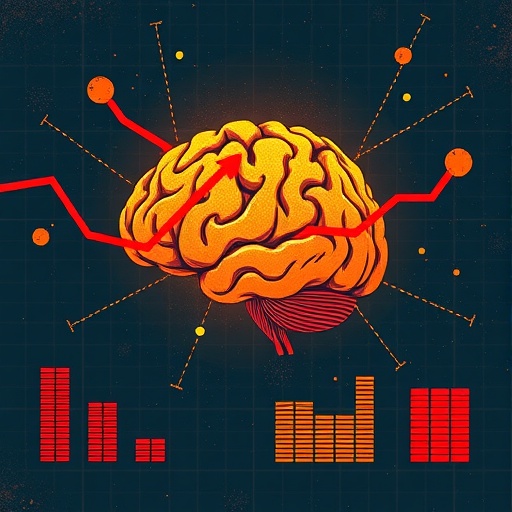In an era characterized by economic fluctuations and escalating living costs, the mental health of individuals is becoming an increasingly pressing issue. A significant body of recent research has shed light on the intricate relationship between economic insecurity, perceived stress, and depressive symptoms. A landmark study conducted by Li, Yao, and Cho, published in the journal Applied Research Quality of Life, provides a longitudinal perspective on these interrelated phenomena. This research is critical for understanding how financial instability can influence mental health over time.
Economic insecurity manifests in various forms, from fluctuating job stability to the rising cost of essential goods and services. Individuals feeling the weight of economic insecurity often experience a profound sense of instability, which can lead to chronic stress. This chronic stress, in turn, significantly impacts mental well-being, contributing to the prevalence of depressive symptoms among affected populations. The study by Li et al. explored this complex web of causes and effects, elucidating the pathways through which economic conditions can affect mental health.
The longitudinal nature of the study allows for a comprehensive analysis of how economic insecurity and stress evolve over time. Unlike cross-sectional studies, which capture a snapshot in time, a longitudinal approach can reveal shifts in mental health correlating with changes in economic conditions. Participants in the study were asked to report their feelings of economic insecurity, their stress levels, and any depressive symptoms they experienced over an extended period. This methodology provided substantial data on how these variables interact with one another.
One of the essential findings of the study is the cyclical nature of economic insecurity and mental health. When individuals perceive their economic situation to be dire, they experience increased stress, which may lead to the onset of depressive symptoms. Conversely, social and economic support mechanisms can help alleviate some of the stress stemming from perceived insecurity. Thus, there is a critical need for interventions that enhance individuals’ resilience against the detrimental effects of economic insecurity.
The implications of Li et al.’s findings extend beyond individual health outcomes. Economically secure populations often exhibit better collective health outcomes, underscoring the importance of stable economic environments. Public policy initiatives that aim to improve job security, increase wages, and provide adequate support for those facing financial hardships could herald significant improvements in mental health on a community scale.
Furthermore, the study prompts critical questions regarding our societal approach to mental health. Are we addressing the economic factors that contribute to mental health issues adequately? The growing realization is that enhancing mental well-being involves tackling the external factors that engender stress and insecurity. As mental health becomes a focal point in public health discussions, it is vital to consider the broader economic landscape affecting individuals.
In addition to economic conditions, the study also delves into the role of social support systems in mediating the effects of perceived stress and depression. Individuals with strong social networks tend to report lower levels of depressive symptoms, even in the face of economic hardship. This points to the importance of community support structures and social engagement as protective factors against the psychological fallout of economic insecurity.
The researchers also identified demographic variables that play a role in the interplay between economic insecurity and mental health. For example, younger individuals, particularly those just entering the workforce, may be more susceptible to the negative effects of economic instability. Interestingly, the study suggests that older adults, while often facing their own economic challenges, may have developed coping mechanisms that mitigate the impact of stress on their mental health.
One of the standout aspects of the research is the discussion surrounding stigma and mental health. Economic insecurity can heighten feelings of shame and isolation, making individuals less likely to seek help for depressive symptoms. Raising awareness about mental health and fostering open conversations can help alleviate this stigma, encouraging individuals to reach out for support without fear of judgment.
As mental health continues to gain recognition as a critical component of overall well-being, studies like that conducted by Li, Yao, and Cho are essential to driving conversation. Their efforts illustrate that mental health is not solely a personal issue but is deeply entwined with economic and social conditions. Policymakers, mental health professionals, and the general public can all draw valuable insights from this research, advocating for changes that prioritize economic stability as a means to enhance mental health outcomes.
In conclusion, the longitudinal study led by Li and colleagues sheds light on a crucial aspect of mental health often overlooked in public health discussions. Economic insecurity is not just a catalyst for immediate stress; it has long-lasting implications for individual and societal mental health. This research emphasizes the importance of addressing these issues at both community and policy levels to foster a healthier, more stable society for all.
Understanding the mechanisms linking economic insecurity to mental health enables us to tailor interventions more effectively. Whether through enhancing social support, advocating for policy change, or fostering community resilience, the evidence is clear: alleviating economic stress is a vital step toward improving mental well-being.
Finally, the critical takeaway from this research is clear: as we navigate the complexities of modern life, we must not only focus on individual mental health strategies but also address the economic factors at play that can lead to distress. By prioritizing mental health in conjunction with economic stability, we can create a society that not only survives but thrives.
Subject of Research: The relationship between economic insecurity, perceived stress, and depressive symptoms.
Article Title: Economic Insecurity, Perceived Stress, and Depressive Symptoms: A Longitudinal Study on Mental Health.
Article References: Li, Z., Yao, R. & Cho, S.H. Economic Insecurity, Perceived Stress, and Depressive Symptoms: A Longitudinal Study on Mental Health. Applied Research Quality of Life (2025). https://doi.org/10.1007/s11482-025-10485-3
Image Credits: AI Generated
DOI:
Keywords: Economic insecurity, mental health, perceived stress, depressive symptoms, longitudinal study.




